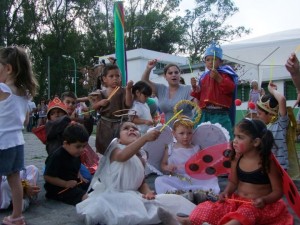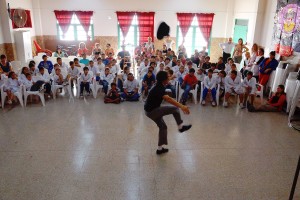Search Results for Tag: Poverty
Reflections on the preconditions for learning
On Wednesday, the third plenary session of the DW Global Media Forum focused on education as the milestone for sustainable development. Denis Goldberg, a social activist from Cape Town, South Africa, argued, “The focus of education should shift to sustainability because we depend on it.” Doing so requires taking action on issues including overpopulation. One of his suggestions for limiting population growth was expanding social safety nets. By doing so, people move away from the idea that having children is the only way to ensure a stable future.
![]() read more
read more
Media trainers must keep sustainability in mind
I have spent three days now at the Global Media Forum. I have met the other bloggers, I have made new friends and met old friends from all over the world. I have eaten and even danced during the famous GMF boat ride on the Rhine River. So besides the serious side of the conference, there is also a fun part to it.
One of my areas of interest as a trained journalist and as a trainer of people in media is the influence of the advancing digital world on journalism. That’s why I attended a workshop organized by the DW Akademie with the title: New Trainers for New Media? Challenges for Human Resources Development in Media Support in a Fast-Changing Media Landscape.
![]() read more
read more
On the need for media literacy and how to promote it
The Global Media Forum started on Monday with plenary session 1: “Rating vs. Quality: Media caught between market pressure and the mission to educate.” It was a very engaging discussion, and there were representatives from the US, Germany, Russia and South Africa. Above all, participant Trevor Ncube made a particular impression on me. He is deputy chairman of M&G Media Ltd in South Africa and chairman of Alpha Media Holdings in Zimbabwe, and he started by saying that when the media neglects Africans, it is generating misinformation.
![]() read more
read more
In favor of a critical approach to the digital world
Wow! I’ve found the Global Media Forum really interesting so far. The first thing that stood out to me was the diversity on display – people from lots of different countries mix at the conference, some in suits, some more casual or in business wear. There are lots of colorful dresses, men from Africa in robes and women in headscarves. The clothing is just an outer signal of how many cultures are represented here. And in the middle of it all are my fellow bloggers and me.
![]() read more
read more
Building a learning community amid harsh conditions
After Barrio Mosconi, the circus workshop moved to El Dique, another slum in the district of Ensenada. Having set foot in both, I could tell the difference between them was that the latter has worse living conditions: informal housing and dirt roads instead of paved streets. Also, as Liliana put it very well during the meeting we had: El Dique has a bigger population, so it is able to have a Centro de Integración Comunitario. The proper translation would be “Community Integration Center,” and it is a special building provided by the government, where there is space for health initiatives as well as social development, arts, education and sports programs. This is where the circus classes took place.
![]() read more
read more
Argentina’s alternative learning spaces
I read Pavel’s entry, and I was thinking about how extracurricular learning environments work here. Clubs obviously exist, but access to them is limited by how much money families have. Pavel suggests in his entry that people tend to look for alternatives outside of the educational model because it hasn’t kept up with the world’s development. For poverty stricken communities in my country, it’s the opposite: kids are falling out of the educational system because they can’t even keep up with its basic demands. That’s due to the fact that their needs are unmet.
![]() read more
read more










Feedback